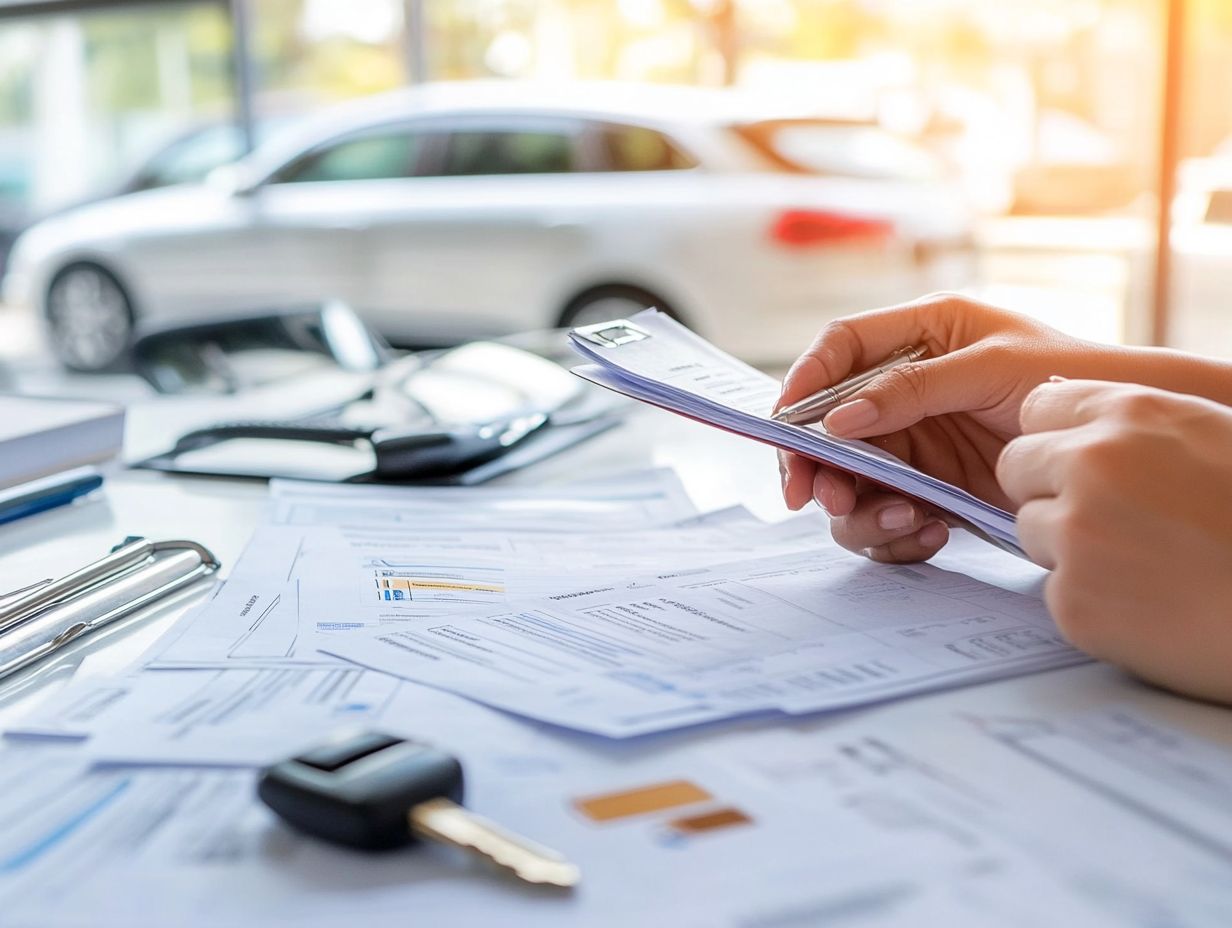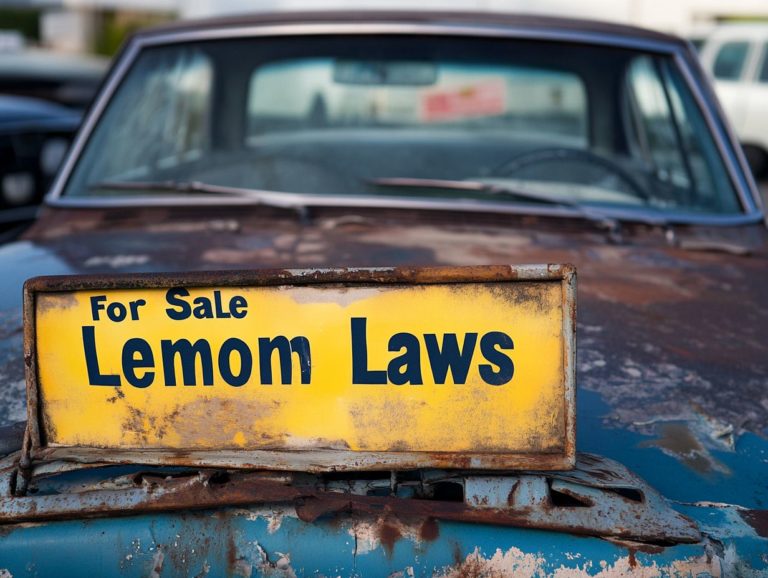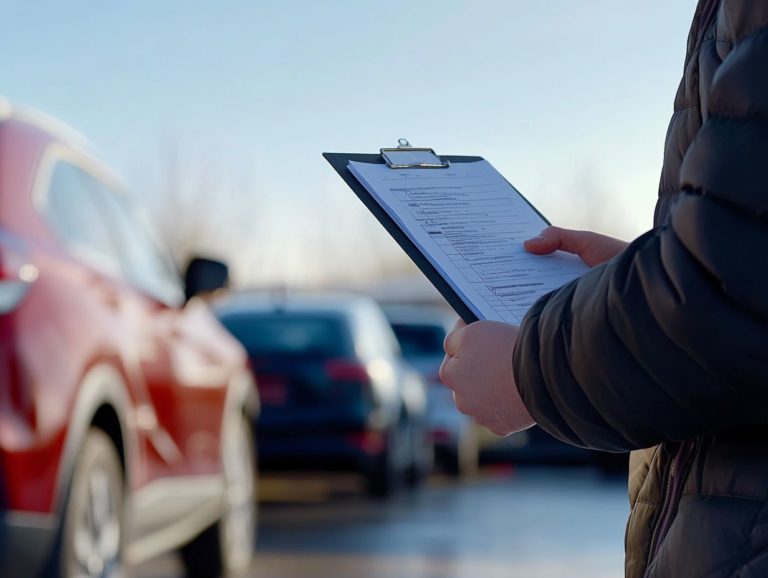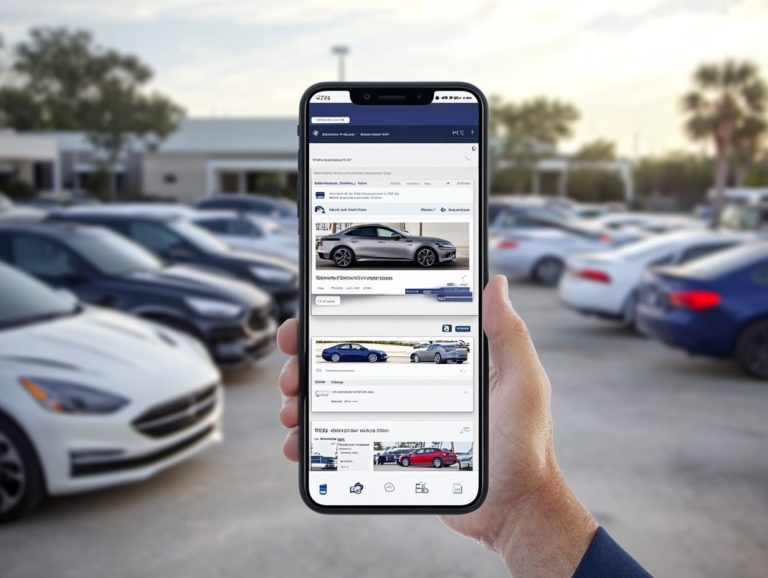What to Know About Insurance for Used Cars
Navigating the world of used car insurance can feel daunting, especially with the multitude of options and factors to consider. Understanding the importance of insurance for your vehicle is a crucial first step in safeguarding your investment.
This article explores the different types of coverage available, including liability, comprehensive, and collision. It breaks down the elements affecting insurance rates and provides tips for finding the best policy tailored to your needs. Plus, you ll save money while doing so!
Prepare to hit the road with confidence!
Contents
- Key Takeaways:
- Types of Insurance for Used Cars
- Factors Affecting Insurance Rates for Used Cars
- How to Find the Best Insurance for Your Used Car
- Tips for Lowering Insurance Costs for Used Cars
- Frequently Asked Questions
- What factors affect insurance rates for used cars?
- Do used cars have higher insurance rates than new cars?
- Can I transfer my current insurance policy to a used car?
- What type of coverage do I need for a used car?
- Do used cars require a different type of insurance than new cars?
- Can I get a discount on insurance for a used car?
Key Takeaways:

Here s what you need to know: Used cars still need insurance!
Don t ignore these essential coverage types: Liability, comprehensive, and collision insurance are your best friends!
Factors such as age, condition, driving history, and location can affect insurance rates for used cars.
Why Used Cars Need Insurance
Used cars require insurance to protect the financial investment you ve made in your vehicle. Unlike new cars, which depreciate quickly, used cars have their own challenges, such as potential mechanical issues and fluctuating insurance rates.
An insurance policy acts as your safety net against unforeseen accidents, damages, or liabilities related to your used vehicle. It ensures compliance with state minimum insurance requirements while providing essential financial protection.
Neglecting to insure a used car exposes you to significant financial risks, especially if an accident occurs. Legal consequences can be severe, as most states require proof of insurance to operate a vehicle legally.
Without appropriate coverage, you could face hefty fines or find yourself liable for costs stemming from damages amounts that could easily surpass the value of your vehicle.
With various coverage options available, such as liability, collision, and comprehensive insurance, you can tailor your protection based on your used car’s specific condition. Evaluating which types of coverage best align with your personal and financial needs is essential, as is understanding how depreciation may impact claim values over time.
Types of Insurance for Used Cars
When insuring a used car, you have several options available, each designed to meet distinct needs and circumstances. It’s also important to understand what to know about used car depreciation to make informed decisions.
Liability insurance helps pay for damages you cause to other vehicles. If you re looking for broader coverage, comprehensive insurance covers a wide range of incidents, not just accidents. Collision coverage, on the other hand, ensures that damages to your own vehicle are taken care of.
Personal injury protection is another invaluable option, as it covers medical expenses arising from accidents. Being well-informed about these insurance options enables you to select the auto insurance policy that aligns perfectly with your unique situation.
Liability Coverage
Liability coverage is a vital part of any used car insurance policy, providing essential financial protection against damages or injuries you may cause to others in an accident. Most states require a minimum level of liability insurance, ensuring you can cover costs related to property damage or personal injury claims stemming from your actions on the road.
Understanding the nuances of liability coverage helps you meet legal requirements while protecting your finances. Failing to meet these minimum requirements can lead to serious repercussions, including steep fines or even suspension of your driving privileges.
If an accident occurs and you re underinsured, you may face substantial out-of-pocket expenses, putting your personal assets at risk if claims exceed your coverage limits.
By educating yourself on liability limits and choosing higher coverage than the state minimum, you can effectively shield yourself from unexpected financial burdens, allowing you peace of mind as you navigate the roads.
Comprehensive Coverage
Comprehensive coverage protects you from many types of risks, like theft and natural disasters. It’s a great choice for used car owners who want to maintain their vehicle’s value.
Unlike liability insurance, which only covers damages to others, comprehensive car insurance focuses on protecting your vehicle from non-collision incidents. This offers a stronger layer of financial security and can be invaluable in reducing potential losses.
This insurance helps maintain your vehicle’s market value and gives you peace of mind, knowing you’re shielded from unexpected costs. The cost of comprehensive coverage can vary based on your vehicle’s age, condition, and location. However, the investment often pays off in situations like a tree crashing onto your car or if it gets stolen events where recovery can be costly and stressful.
Comprehensive coverage is especially beneficial in areas prone to severe weather or high crime rates. This way, when unfortunate events occur, you can recover with greater ease and preserve your financial stability.
Collision Coverage

Collision coverage is crucial. It covers damage to your vehicle from accidents, whether you hit another vehicle or an object.
This type of coverage is particularly helpful for used car owners who want to avoid the financial burden of repair costs due to accidents, regardless of fault.
Including collision coverage protects your vehicle’s integrity and value over time. This protection lets you drive confidently, knowing you’re covered against unexpected mishaps.
Unlike comprehensive coverage, which handles non-collision incidents, collision coverage focuses on accident aftermath.
One standout benefit is that it speeds up repairs, minimizing the time you might be without your vehicle. Premium costs for this coverage can vary based on factors like your car’s make and model, your driving history, and the overall safety features of your vehicle.
By staying diligent with vehicle upkeep, you can enhance safety and potentially lower your insurance premiums.
Factors Affecting Insurance Rates for Used Cars
Several factors influence insurance rates for used cars, which affects the premium you pay to your insurance company.
Key elements include the age and condition of your vehicle; older cars often depreciate more quickly. Additionally, your personal history, including your driving record and claims history, plays a significant role.
Understanding these factors helps you make informed choices and secure better insurance rates tailored to your situation.
Age and Condition of the Car
The age and condition of your car greatly affect your insurance rates. Older vehicles often depreciate faster and are more likely to need repairs.
Insurance companies consider these factors when calculating risk, which in turn affects your premiums. By knowing how these elements influence rates, you can choose the right coverage without overspending.
For example, if you drive a ten-year-old sedan that frequently needs maintenance, you might pay higher insurance premiums compared to a newer model that’s less prone to issues.
Similarly, the specific condition of a used car like its mileage and any prior accidents can impact depreciation and how insurers assess potential claims.
It’s crucial to recognize that luxury vehicles often have steeper insurance rates due to high replacement costs, regardless of age.
Being informed about these factors can help you make wise purchasing decisions and keep your insurance costs manageable.
Driving History and Location
Your driving history and location are key factors in determining your insurance rates. Insurers evaluate risk based on your past behavior behind the wheel and the environment where you operate your vehicle.
Insurance companies analyze your individual driving patterns. They consider elements like the number of claims you’ve filed and any citations you’ve received to calculate your insurance costs accurately.
The geographical specifics of your area whether urban or rural also play a significant role in shaping your rates. Urban drivers typically face higher costs due to increased traffic density and potential hazards.
Certain regions may impose unique insurance requirements or regulations. This can complicate the quoting process. It’s essential to assess how your location impacts your overall insurance costs.
By taking these factors into account, you can make informed decisions while shopping for affordable car insurance.
How to Find the Best Insurance for Your Used Car
Finding the best insurance for your used car requires a meticulous approach. Compare options and obtain precise quotes that align with your specific needs and budget.
Begin by collecting multiple insurance quotes from various providers. Evaluate coverage options, costs, and any available discounts that may apply to your situation.
This strategy helps you make an informed decision. You’ll secure affordable insurance tailored to your individual requirements.
Comparing Quotes and Coverage Options

Comparar cotizaciones y opciones de cobertura es un paso vital para asegurar el mejor seguro para tu auto usado. Esto te permite evaluar varias p lizas lado a lado.
Al obtener m ltiples cotizaciones de seguro de auto, puedes evaluar las opciones de cobertura. Comprende los costos asociados con cada p liza.
Esta comparaci n te ayuda a identificar el plan de seguro m s adecuado que se alinee con tus necesidades financieras y de protecci n.
A medida que examines estas cotizaciones, es crucial mirar m s all del precio. Considera los l mites de cobertura ofrecidos por cada p liza.
Diferentes aseguradoras proporcionan niveles de protecci n variados. Evaluar los deducibles es igualmente importante; un deducible m s bajo puede parecer atractivo.
Sin embargo, a menudo conduce a costos m s altos. Un deducible m s alto puede reducir tus costos, pero puede aumentar tus gastos de bolsillo en caso de un reclamo.
Presta atenci n a cualquier beneficio adicional incluido en las p lizas. Factores como asistencia en carretera o reembolso de autos de alquiler ayudan a moldear el verdadero valor del seguro.
Estos elementos te ayudar n a tomar una decisi n informada que se adapte a tus circunstancias nicas.
Tips for Lowering Insurance Costs for Used Cars
Take action now to lower your insurance costs for used cars. Employ various strategies that enhance your financial protection while maintaining effective coverage.
By taking advantage of available insurance discounts, you can significantly reduce your expenses. Opting for a higher deductible and keeping a clean driving record can help as well.
These approaches not only help in lowering your overall premium. They also ensure that your essential coverage remains intact.
Start comparing quotes today to find the best insurance options for your needs!
Strategies for Saving Money on Insurance
You can save a lot on insurance by using smart strategies. This way, you ll still have good coverage for your used car.
Look for insurance discounts and partnerships. Regularly compare quotes to find the best options for you.
These strategies help you save money. They also guide you in making smarter insurance choices.
Safe driving can help lower your premiums. Keep a clean driving record. Consider taking defensive driving courses for extra discounts.
Raising your deductibles can be smart. It may lower your monthly payments, even if it means paying more out-of-pocket for a claim.
Join loyalty programs with your insurer. This can lead to more savings over time.
Use these strategies to manage your insurance better. You’ll likely see improved financial results.
Frequently Asked Questions
What factors affect insurance rates for used cars?
Several factors can affect insurance rates for used cars, including the age and condition of the car, the driver’s age and driving history, the type of coverage desired, and the location where the car will be driven and parked.
Do used cars have higher insurance rates than new cars?

In general, used cars tend to have lower insurance rates than new cars, as they have already depreciated in value and are typically cheaper to repair or replace. However, if a used car is considered a high-risk vehicle, such as a sports car or a model with a history of frequent accidents, its insurance rates may be higher than a new car.
Can I transfer my current insurance policy to a used car?
Yes, you can transfer your current insurance policy to a used car, but it’s important to notify your insurance provider of the change in vehicle. Depending on the specifics of your policy and the type of used car you are insuring, your rates may change.
What type of coverage do I need for a used car?
The type of coverage you need for a used car will depend on a variety of factors, such as the age and value of the car, your budget, and your level of risk tolerance. Common types of coverage for used cars include liability, collision, and comprehensive insurance.
Do used cars require a different type of insurance than new cars?
No, used cars do not necessarily require a different type of insurance than new cars. However, depending on the age and condition of the used car, it may be more cost-effective to opt for a different level of coverage than you would for a new car.
Can I get a discount on insurance for a used car?
Yes, there are several ways to potentially receive a discount on insurance for a used car. For example, you may qualify for a discount if the car has certain safety features, if you have a good driving record, or if you bundle your used car insurance with other policies, such as homeowners insurance.






